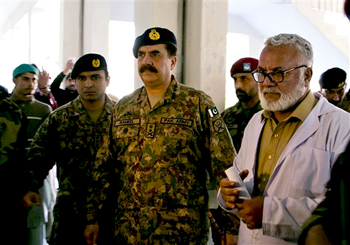Islamabad, Oct 6: Pakistan army chief General Raheel Sharif today accused India of spreading a "litany of falsehoods" and warned that any aggression or a "strategic miscalculation" against his country will not go unpunished.
 "We have recently witnessed an unfortunate display of utter desperation" playing out inside Kashmir and along Line of Control through a "litany of falsehoods and distortion of facts by India", Raheel said while addressing the passing out ceremony of Pakistan Air Force (PAF) cadets in Risalpur, Khyber-Pakhtunkhwa.
"We have recently witnessed an unfortunate display of utter desperation" playing out inside Kashmir and along Line of Control through a "litany of falsehoods and distortion of facts by India", Raheel said while addressing the passing out ceremony of Pakistan Air Force (PAF) cadets in Risalpur, Khyber-Pakhtunkhwa.
"We expect international community to condemn Indian insinuations and fabrications about a nation that has made unparalleled contributions in the global fight against terrorism," he said.
Raheel's comments assume significance as they come amidst the strain in Indo-Pak ties after the Uri terror attack and India's surgical strikes on terror launch pads in Pakistan- occupied Kashmir. Pakistan claims no surgical strikes have taken place.
"Any aggression, born out of deliberate intent or even a strategic miscalculation, will not be allowed to go unpunished and will be met with the most befitting response," Raheel said.
"We will be highly relentless in defending our motherland against entire spectrum of threat. I am confident that with the united resolve of our nation and its armed forces, those inimical to regional peace will not be allowed to succeed. Their evil plots and plans will be defeated," he said.
Raheel claimed that "enemies" of Pakistan's peace and prosperity have been distressed by the sight of the country's "successes".
"These enemies will now attempt to accelerate their efforts to reverse our gains and derail our progress through direct and indirect strategy," he asserted.
Raheel said Pakistan is a "responsible" country and claimed that it remains committed to following the policy of friendship with all other countries based on the principles of equality and mutual respect.
"While doing so, the armed forces of Pakistan remain fully prepared to give the most befitting response to any kind of internal and external threat posed to our nation," he said.
"Their (enemies') nefarious designs will not be allowed to succeed at any cost. Resolute efforts to consolidate our gains is the only way forward for which we will not leave any stone unturned," Raheel said.
He claimed that Pakistan was making efforts to eliminate militancy.
"Internally, Operation Zarb-e-Azb had successfully turned the tide against terrorism. We are engaged in eliminating the terrorism infrastructure from our soil and foil nefarious designs of our enemies," he said.





Comments
Add new comment